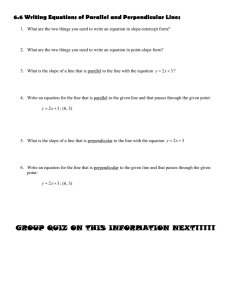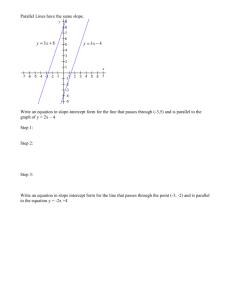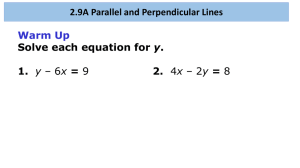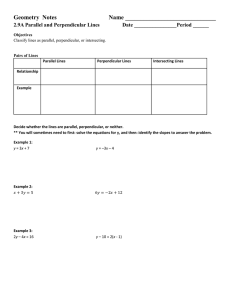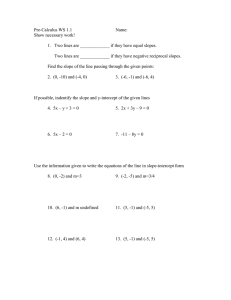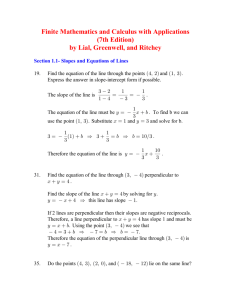Chapter 1: Linear relations and functions Section 1-5: Writing Equations of
advertisement
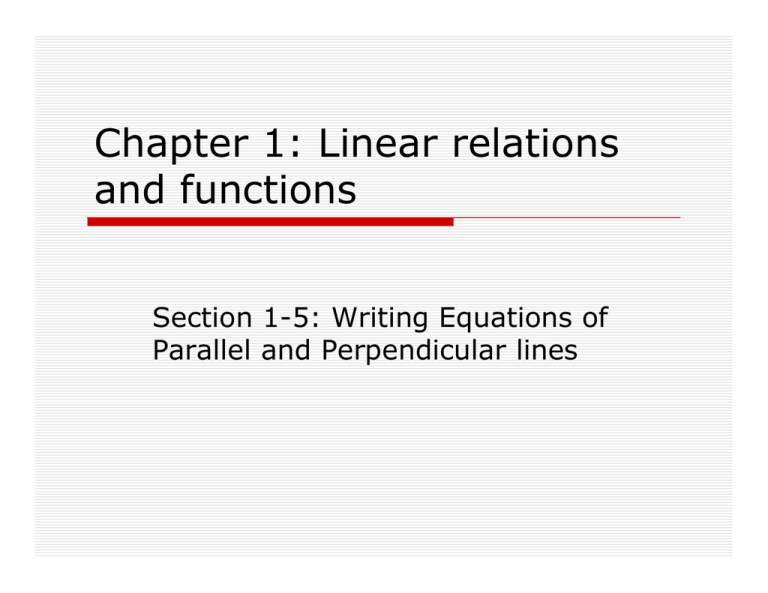
Chapter 1: Linear relations and functions Section 1-5: Writing Equations of Parallel and Perpendicular lines Parallel lines have the same slope Two nonvertical lines in a plane are parallel if and only if their slopes are equal and they have no points in common. Two vertical lines are always parallel. m is the same, but the b is different in the slope-intercept form Coinciding lines Two lines are coinciding if they represent the same line. M and b are the same in the slope intercept form. Perpendicular lines have opposite reciprocal slopes Two nonvertical lines in a plane are perpendicular if and only if their slopes are opposite reciprocals. A horizontal and a vertical line are always perpendicular. Example # 1 Determine whether the graphs of each pair of equations are parallel, coinciding, perpendicular or neither 2x+4y=4 x+2y=5 Slope-intercept form: y=- 1 x + 1 2 y=- 1 x + 5 2 Since the slopes are equal and the b’s are different, the lines are parallel Example #2 4x+3y-7=0 6x-8y+28=0 Write in slope intercept form y= − 4 x + 7 3 3 y= 3 x + 7 4 2 Since the slopes are opposite reciprocals of each other, the lines are perpendicular. Example #3 Write the standard form of the equation of the line that passes through the point at (-2,10) and is parallel to the graph of 2x+5y+4=0 Solution: Since we are looking for a line parallel to 2x+5y+4=0, we know that they must have the same slope. The slope of 2x +5y+4=0 is − 2 . 5 So the equation will have the form y= − 2 x+b . 5 Now since the point (-2,10) is on this line, it must make the equation true. In order for that to occur b= 46 2 − 10= 5 (−2) + b 4 so 10= + b 5 5 which means b= 46 Therefore the equation of the line in standard form is 2x+5y-46=0 5 Now you do one. Write the standard form of the equation of the line that passes through the point at (2,-3), and is perpendicular to the graph of 6x-8y-5=0 Next Example Determine the equation of the perpendicular bisector of the line segment with endpoints A(2,3)and B(6,-1) Solution The perpendicular bisector is the line that bisects the existing line at a right angle Therefore, we need to find the midpoint of the existing line that has endpoints (2,3) and (6,-1) Recall the midpoint formula from geometry. ⎛ 2 + 6 3 + − 1⎞ ⎜ ⎟ ⎜ 2 , ⎟ 2 ⎝ ⎠ = (4, 1) Now the slope of the line with points A and B on it is -1, so the slope of the perpendicular line will be 1 and the equation will be y=x+b. Now the point (4, 1) is the midpoint and on both lines and will must make both lines true. S0 1=4+b means that b must be -3. So the equation of the line is y=x-3. In standard form it is x-y-3=0 HW#5 Section 1-5 Pp. 36-37 #12,13,15,17,19,21, 23,25,33,37,38,40
